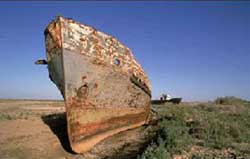 Flying back-finally-to South Asia this past week, I soon gave up on the horrible films, bland food and general squalor of British Airways economy class and wandered to the back of the aircraft. There, I leaned on the rear door, feeling that peculiar sensation that comes from knowing that a simple mechanical failure in the latch would launch one into space for a few minutes of wondrous, freezing terror, followed by the oblivion of impact.
Flying back-finally-to South Asia this past week, I soon gave up on the horrible films, bland food and general squalor of British Airways economy class and wandered to the back of the aircraft. There, I leaned on the rear door, feeling that peculiar sensation that comes from knowing that a simple mechanical failure in the latch would launch one into space for a few minutes of wondrous, freezing terror, followed by the oblivion of impact. 
But I wasn't there for cheap thrills. I had noticed on the in-flight route map that we were flying above Central Asia, just crossing the Uzbekistan border from Russia. Below us, according to the map, lay a great blob of blue called the Aral Sea. Once this was one of the world's largest landlocked bodies of salt water. Now, as most people know, it's a testament to howling ignorance about the consequences of our arrogant ineptitude.
Instead of a body of water several hundred kilometres across, the Aral Sea is now a series of poisonous ponds, linked by toxic salt flats. Badly rusted fishing boats sit on ridges of corrosive soil, three days walk from the nearest water. The communities where the fisherfolk lived and plied their trade have either disappeared beneath the shifting sands or become graveyards of the victims of the Aral Sea's despoliation.
It's easy to blame the arrogance of Soviet communism for the fate of the sea and its people, the once rich fishery and culture on the shores of a once pristine body of water. Engineers from Moscow planned the great diversions of rivers that fed the Aral, urged on by political commissars drunk on the notion of conquering nature. Cotton, the world's most widely grown crop, killed the Aral Sea. The rivers were ripped from their natural courses to irrigate thirsty cotton fields in Uzbekistan, the old Soviet Union's cotton belt. Cotton sucks water and pesticides like few other plants and the aquifers of the northern Uzbek plains were soon drained.
So fresh water from the Amu Darya, known in Europe as the River Oxus, and other great streams was sent gushing into a desert that once lay under the ancient Silk Route but now was a vast, white-tufted cotton plantation. Year by year, a sea deprived of inflowing waters receded, stranding those fishing fleets. At first, the people were puzzled, then alarmed as the fishery failed in the remaining waters of the Aral Sea-by this point too toxic, too overwhelming salty, for life ever to be born. Then they were frightened as their growing poverty and hunger was compounded by wracking respiratory disease. Storms of poison dust were blowing off the cotton fields and the salty bed of the dried up sea. Even the unborn were affected. Birth defects soared and the living died, how many we'll never know. The USSR had more anonymous victims of viscous bureaucracy than any other evil empire the world has known. I wonder if there are any more miserable than the lost citizens of the area around the Aral Sea.
The big plane banked to the right and I could see more clearly the lay of the devastated land below. A long gnarled peninsula protruded into a remnant of the sea-small and no doubt shallow. I wondered if this could be the dreaded "Island X" where Moscow had once developed its deadly biological weapons: anthrax, smallpox, influenza and other dreaded diseases bred to kill people in the name of a twisted state ideology. Intrepid reporters-most of them Russian and citizens of the former Soviet Union- discovered this still walled up and highly mysterious laboratory while ferreting through declassified documents and the subsequent outcry had led to its final closure, once and for all. The viruses and compounds within were supposedly made inert and harmless, but we may never know.
Supremely, severely ironic it is, that the commissars of Moscow chose an island in the Aral Sea to plan deliberately an assault on the health of ordinary people in enemy lands, while all around their own policies were killing tens of thousands of their own citizens. That of course lay suppressed and hushed up too until the fall of communism.
It's funny what you can see from a great height. It's equally stark just what you miss. I can only hope that governments in today's unipolar world, in Washington, Europe, Asia and elsewhere, learn something from the hideous errors of the old Soviets Union. Arrogance and secrecy breed only death and destruction, and the commissars discovered to their cost. To those in America who are closing minds and restricting access to information in the name of security, I say Only...remember the Aral Sea.



